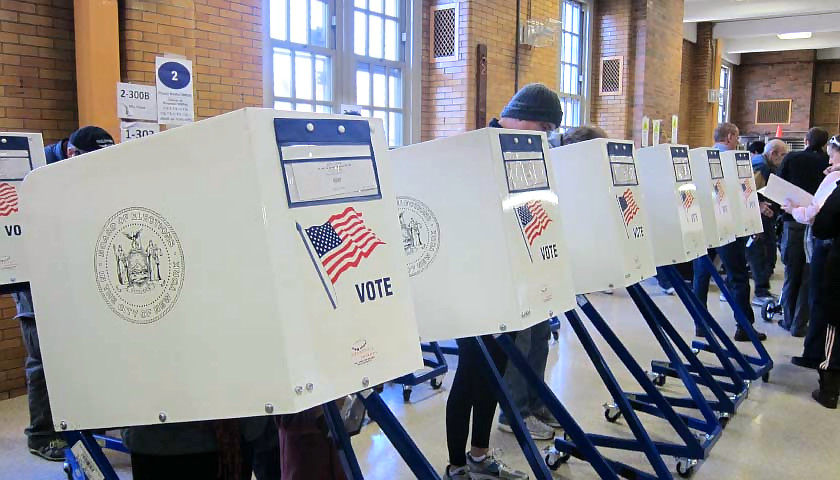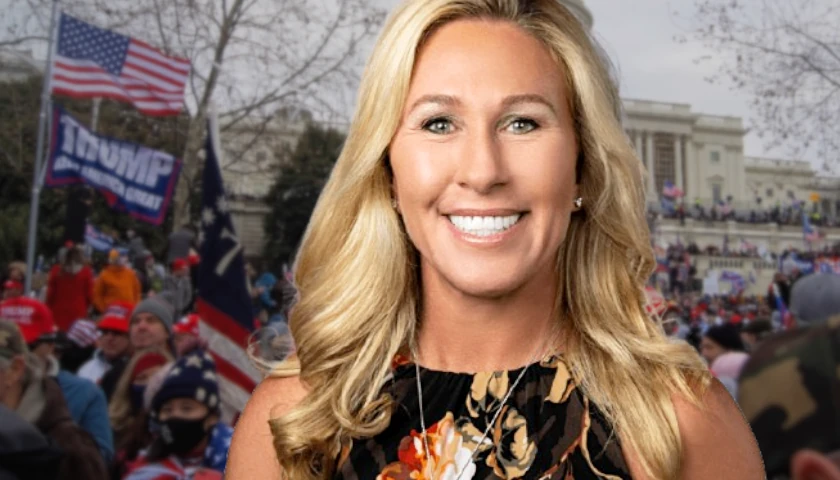by Christopher Roach
A memo must have gone out. Because in several prominent newspapers, the same propaganda appeared at nearly the same time.
The Washington Post said, “Top Republicans, led by Trump, refuse to commit to accept 2024 election results.” The New York Times similarly intoned, “Leading Republicans have refused to say flatly that they will accept the outcome of the presidential election if Donald Trump loses.” Rolling Stone chastised a former presidential candidate: “Tim Scott Embraces Trump’s Election Denialism, Won’t Commit to Accept Results.”
While ordinarily, elections mean both sides accept the procedures in advance so that either side may have confidence in the results, actual confidence in those results depends upon what actually happens. If you have good rules, but there is extensive rule-breaking, why should anyone accept the results?
The recently minted requirement of pregame assent to an election outcome is a ridiculous demand akin to a religious test. Even in the best of times, no one can ever have certainty about an election outcome. Elections consist of hundreds of millions of votes and tens of thousands of rules and regulations, are conducted in 50 states and thousands of counties, and involve the actions of thousands of officials and volunteers to implement and interpret these rules.
Trump’s critics are asking him to have faith and pledge his support for the unknown result of an election that has not happened. In fact, the rules are in flux and will be so until nearly the last minute through court and legislative maneuvering, as was the experience of recent elections. Furthermore, every election has recount procedures and is subject to legal challenges.
The upcoming election is one where the machinations of prosecutors, local party officials, domestic intelligence agencies, and the current administration are all unknown, but we do know we live in an era of extreme partisanship and that the people running most of the institutions, regardless of party, are irrevocably hostile to Trump. Nonetheless, they demand that Trump ignore the fact that some of the most senior officials in New York, Georgia, and the federal government are hell bent on stopping him from being president.
Under these circumstances, Trump and his supporters’ anticipatory skepticism of the 2024 election is warranted. A prudent person will wait to see what happens. Critics imply that Trump will only cry foul if he loses, and this is probably true, but it is okay to cry foul when the other side does not win fair and square.
For example, Republican skepticism of the 2020 election was warranted. Even if somehow Biden got the most votes, the means by which he did so was unorthodox and probably illegal. Things happened that we only previously witnessed in Third World countries: weeks of vote counting, millions of unverifiable mail-in ballots, rule changes later deemed to be unlawful and unconstitutional, a refusal of the media or courts to look into irregularities, violence coordinated by the intelligence agencies to stop any inquiry permitted during the electoral vote count, and a sustained effort to pressure Trump to concede even as the matter remained in extreme doubt.
This should all be contrasted with the conduct of the 2016 election. Trump won. That election was more normal, with enough verifiable and morally certain wins to call the result on election night. The rules governing the election were the same ones that always applied. True, the result defied the polls and was unexpected—particularly by Hillary Clinton, the media, and her other supporters—but there was nothing procedurally unusual that happened on election day or thereafter to cast the result in doubt.
The post-election weirdness, however, began immediately in 2016. Hillary refused to concede and did not address her supporters until the next day. Then a story floated in the weeks before the election became a firestorm—the supposed critical impact of “Russian collusion.”
This turned out to be complete nonsense, ginned up from a false dossier funded by the Clinton campaign and promoted by partisan intelligence agencies. But it was also the alibi for Hillary’s loss—a vague suggestion that machines were hijacked and Trump was an illegitimate president, regardless of the formal outcome of the election.
Russian collusion became the Trojan Horse through which the intelligence agencies got Trump’s preferred National Security Advisor, Michael Flynn, removed and then indicted, as well as his first Attorney General and immigration hawk, Jeff Sessions, to resign.
Corrupt FBI head James Comey used the same nonsense story to lie to and spy on Trump, and Comey’s eventual termination led to the appointment of the half-senile Robert Mueller and his partisan accomplices to harass Trump as special counsel. The Mueller charade went on for two years, handicapping and distracting Trump during his first two years as president, even though the special counsel office’s internal reports showed that the prosecution team knew the original Russian collusion allegations lacked all merit.
What Biden and his supporters are looking for with all the “accept the result” talk is precommitment. This is something guys in sales do. You said you need to be below $100; if I get you a price below $100, you are telling me you will buy. But Biden and company are not saying anything persuasive to gain bipartisan assent to the election process. They just want the commitment, so if they pull off a win—legitimately or otherwise—they can use the pledges to shut up their critics.
The approach brings to mind the attempts to box Trump in during the 2016 Republican primary. All of the Republicans figured Trump would ultimately lose to an establishment choice but that he might cause chaos out of spite. So they demanded that he sign a pledge to support the eventual nominee. Everyone else did it—Jeb Bush, Marco Rubio, Chris Christie, and Lindsey Graham—and they used it as a cudgel against Trump. Trump hemmed and hawed, but he eventually signed the pledge too.
Then Trump, rather improbably, won the Republican primary. And now the pledge had become an albatross for his enemies, who meant to confine him. At that point, Jeb, Graham, and others among these supposedly moral and honorable men, men allegedly offended by Trump’s lack of morals and decorum, went back on their pledge and worked overtly and covertly to undermine Trump. What a bunch of rats!
There is no reason for Trump or anyone to support the results of the 2024 election and certainly not this far in advance. There are fewer reasons to trust the process or the people running the process than one could in the high-trust America of yesteryear. Some of the most respected institutions, like the FBI and the courts, have become unhinged and dangerous in their maniacal desire to stop Trump. Nothing about a diverse, highly partisan, and increasingly corrupt society like ours makes “trust” something that we should feel about the election, nor is skepticism something to be ashamed of. It’s just common sense.
The items of societal consensus are shrinking every day. A fair election in 2024 that commands the assent of both sides seems unlikely. The Trump people, having been burned before, are primed to reject anything but a win, particularly in light of weeks of positive poll numbers. And the anti-Trump factions are so attached to holding onto power that they will change the rules in order to keep it and browbeat those who commit the crime of noticing.
It is our job to win. And, win or lose, it is our job to notice what is happening and shout it from the rooftops.
– – –
Christopher Roach is an adjunct fellow of the Center for American Greatness and an attorney in private practice based in Florida. He is a double graduate of the University of Chicago and has previously been published by The Federalist, Takimag, Chronicles, the Washington Legal Foundation, the Marine Corps Gazette, and the Orlando Sentinel. The views presented are solely his own.
Photo “Voting Booths” by Joe Shlabotnik. CC BY-NC-SA 2.0.








